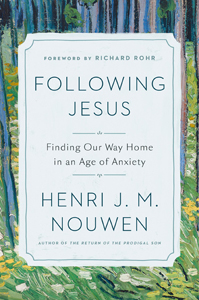 Henri Nouwen, Following Jesus: Finding Our Way Home in an Age of Anxiety (New York: Random, 2019), 140pp.
Henri Nouwen, Following Jesus: Finding Our Way Home in an Age of Anxiety (New York: Random, 2019), 140pp.
When I found this book at our public library, I thought it had to be a re-packaging of some of the earlier works of Henri Nouwen (1932–1996). After all, he died almost twenty-five years ago, and wrote some forty books. But I was wrong. According to Gabrielle Earnshaw, a historian and the founding archivist of the Henri Nouwen Archives, this "never-before-published book" is based upon six talks that Nouwen gave during Lent at St. Paul Church in Cambridge, Massachusetts, in 1985. That was a pivotal year in Nouwen's life.
In 1985, Nouwen moved from the world of the best and the brightest to the world of the weak. After professorships at Notre Dame (1966–1968), Yale (1971–1981), and then Harvard (1983–1985), he made the most important decision of his life. He left Harvard and moved to Toronto, where for the last eleven years of his life (1985–1996) he served as the residential priest at Daybreak, a home for people with severe physical and mental disabilities that was founded by Jean Vanier.
After twenty-five years in the priesthood, Nouwen recounts that as he was turning fifty he began to experience “a deep inner threat.” He was praying poorly, living in isolation from others, preoccupied with being relevant, and sensing that his success in academia had placed his soul in peril. “I woke up one day with the realization that I was living in a very dark place and that the term ‘burnout’ was a convenient psychological translation for spiritual death.” Living among the weak, and “suddenly faced with my naked self,” was the starting point for Nouwen to discover his “true identity” as a child loved by God: “These broken, wounded, and completely unpretentious people forced me to let go of my relevant self—the self that can do things, show things, prove things, build things—and forced me to claim that unadorned self in which I am completely vulnerable, open to receive and give love regardless of any accomplishments.”
So, the themes of this new-but-old book about following Jesus in an age of anxiety were not just theoretical for Nouwen when he wrote and delivered them at St. Paul. It was the life he was living. The format of the book is quite simple. Each chapter begins with a passage from Scripture, proceeds with an exposition of the Biblical material, and then concludes with a prayer. Nouwen's prose is simple to a fault. There is very little autobiographical material in these talks, or mention of current events, historical figures, critical questions, or other authors — just a simple trust in the power of the Jesus story.
Part of what endeared Nouwen to so many people was how he wore his heart on his sleeve. He believed that what is most personal might be the more universal. In this book, for example, he writes: "When I think about how I live my life, and how others live theirs, I am amazed by how enormously needy I am. I am in need of affection. I am in need of attention. I am in need of affirmation. I am in need of praise. I am in need of influence, power, and success. I sense how strong these needs are in me and how strong they are in others" (52). Nor is this rhetorical exaggeration, as the biography of Nouwen by Michael Ford makes clear (Wounded Prophet, 1999). But after having embraced his own neediness, fears and wounds, he encourages us to accept that we are accepted by Him whose love never fails.
Dan Clendenin: dan@journeywithjesus.net


